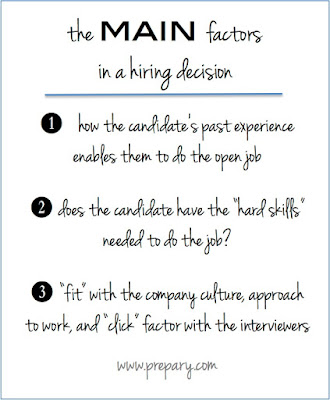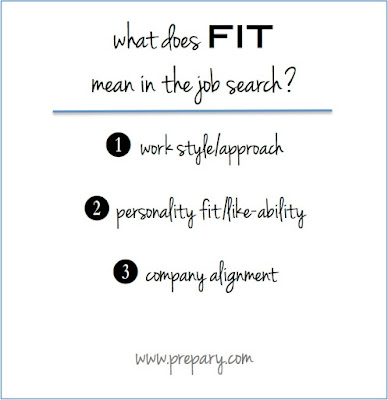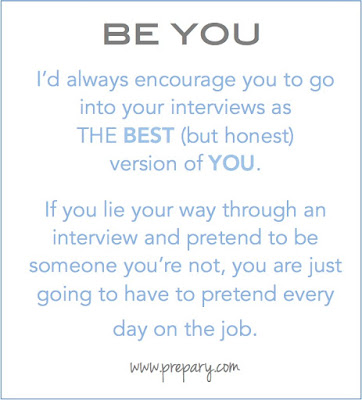Source: http://www.prepary.com/what-does-fit-mean-in-the-job-search-and-interview-process/
January 3, 2013
During your job search, you’re probably not going to get a ton of feedback on why you weren’t hired for a particular role (here’s why). However, one of the most common reasons for not being selected is about “fit”. I myself have heard plenty of times that something “wasn’t the right fit” but it’s still a confusing statement. So what does fit mean in the job search and interview process?
Though I’ve tried not to use this reason during my years as a recruiter, I do now understand what it means. Here’s some insight…
There are a few factors that go into deciding whether someone is right for a job:

- The first two parts are initially judged by the resume but then further pressed on during the interview.
- For example, if I am applying to an Executive Assistant role and one of the daily tasks needed is “calendar management through Excel” and I have on my resume “Managed the calendars of multiple executives on a daily basis” then it appears as though I’ve checked the box on that. When I go into my interview, a good interviewer would probe further – “how many meetings per day would you schedule?” or “have you ever booked and schedule business travel?” Questions like this will allow the interviewer to understand the amount of depth I’ve done what I say I’ve done and if it translates across industries, companies, etc.
- It’s the same things with skills. If I say I am proficient in Excel in my “skills” section of my resume, an interviewer might ask me “what type of formulas have you used in excel?” or “what types of models have you built?” They’re just going into more depth.
- Now for the pesky quality known as “fit”…
- It’s not so black and white. After the interviewer has gauged that you can do the job (per the above questions) they want to assess how you will go about doing the job.
So, what does fit mean? Fit (when it is used during the job search/interviewing process) really boils down to a few things:

- Work “style” or approach
- Do you get things done in a way that is really intense or more laid back? Do you like to get a lot of input from others or work more independently? Do you take a more creative approach or do things “by the book”?
- Each company has a unique culture that dictates the preferred “approach” to work. Based on all the questions the interviewer asks you, they will make a judgment on if your work-style and approach will fit in with the way things are done within the company.
- Personality fit/like-ability
- This can be a bit arbitrary but it really does boil down to “does your interviewer like you”? Would they want to sit at the desk next to you? Would they want to go to lunch with you?
- This isn’t something that interviewers readily admit to but it can influence their decision.
- Company alignment
- Does your attitude towards the company and what they do align with the attitude your interviewers have towards the company? Think about interviewing in the entertainment industry – say at HBO. Pretty much every person there has watched every HBO original series and is psyched about it. They probably want to hire people who are also really excited about them.
When it comes to fit, I don’t think you should ever try to “play the game”, figure out the right answers, and feed them to your interviewer. First of all, it’d be nearly impossible to figure out what the “right” answers are. Secondly, you want to work at a company that is the perfect FIT for you.

Honestly, that takes a ton of energy and doesn’t feel great. So if you get turned down based on fit, try to remember that it’s for the best. Just like in any relationship, you want to be with someone who wants to be with you. Take my word for it, you also want to be on a team and with a company who wants to hire you for exactly who you are.
The best communication style for a job interview By Jaime Petkanics
Source: http://www.prepary.com/communication-style-interviews/February 13, 2017
One of my most popular services right now is interview prep. During these sessions I cover interviewing strategy for tough questions, conduct a mock interview, and give feedback.
When it comes to feedback I share, there are usually two buckets: what someone says and how they say it.
The truth is that your tone and communication style matter in an interview. You could be the most qualified candidate in the world, but if you can’t get that across in a way that resonates, you’re not going to get the job.
On this topic, many people wonder how formal or casual they should be in an interview — and how much they should be themselves vs. saying what they think the other person wants them to say.
Here are my thoughts on this topic:
Level of formality depends on the company
Similar to what I recommend when writing cover letters or networking emails while job searching, I think it’s important to pay attention to the company’s communication style before you go into an interview.
In really formal or serious environments, you should be a bit more buttoned up and but in fun or quirky, it will be important to let some more personality through.
I always recommend checking out how the company communicates with their customers on their website, advertising, and social media channels. This will give you a good indication of their vibe and culture.
That being said, even with the most seemingly casual companies, always remember that you’re in a job interview so things like cursing, chewing gum, and super laid-back body language are always off limits.
Be yourself (if you were having dinner with someone’s parents)
Show personality without fully letting your guard down. Be charming but not inappropriate. Basically, be yourself on your best behavior.
My view on this is that you don’t want to pretend to be someone else in an interview. If you do that and get hired it means you’re going to have to pretend to be someone you’re not every single day on the job, which would take an insane amount of mental energy.
However, being yourself doesn’t mean just letting yourself go and saying whatever comes to mind.
My rule of thumb is to pretend that you’re having dinner with a friend or significant other’s parents, which means you are yourself, but maybe just a bit more careful than usual.
Share your accomplishments, but check your ego at the door
You know how there are some people in your life that you feel you don’t need to go out of your way to impress because they just get you? Interviewers do NOT fall into that category.
It is up to you to make sure you interviewer walks away from your chat knowing your big strengths, accomplishments, and the value you could add if you were to join their team.
However, that doesn’t mean all decorum goes at the window and you can just ramble off a laundry list of all the reasons you’re better than everyone else. Framing is EVERYTHING when it comes to talking about yourself.
For example, saying “one thing I’m really proud of is that I’ve been able to close roles in an average of X days, which is significantly faster than the team average, without sacrificing candidate quality” sounds a lot better than “I’m by far the best and fastest recruiter on my team.”
It’s more polished, more results-oriented, and shows more humility.
Don’t share your deepest, darkest weakness or biggest mistake
Having conducted tens of thousands of interviews, I do think authenticity is critical in an interview. You don’t want to sound like a robot or convey that you think you’re perfect.
Answering more negative interview questions is part of most interviews. Do open up about key learnings, mistakes made, and areas you’ve worked on, but also keep your guard up.
When asked about a big mistake, don’t give your biggest. When asked about a weakness, don’t give one that you know is absolutely critical to the job… even if it’s the truth (though in that case, I’d consider why are you interviewing for that job to begin with).
Be clear, and share only the most relevant details
When you’re talking to someone who doesn’t know you that well, you need to explain things in a way that is really clear and not unnecessarily complicated. Err on the side of spelling things out and give plenty of examples to back up what you’re saying.
However, not all details are relevant details. For example, your interviewer likely doesn’t care about every internal nuance to your organization.
They simply want to know what you worked on, your results, and who you partnered with. Don’t pepper them with tons of details unless they help you to achieve your ultimate goal in some way.
Your goal in an interview is to prove you can do the job, do it really well, and do it in a way that aligns with the culture of the company and team you’re interviewing with. That’s it!
I hope this post helps you determine an appropriate, clear, and impressive tone and communication style before going into your next job interview.

































No comments:
Post a Comment